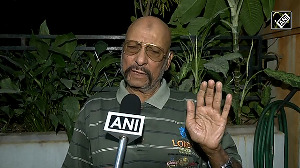Ahmed Chalabi's denial that he is in the running for the top job in Iraq is a frank admission by the Pentagon's favourite candidate that there are other Iraqis better suited, better qualified and far more popular than he will ever be.
In a city like Karbala, the majority Shia population's spiritual heartland, the very mention of Chalabi's name is guaranteed to start people laughing. And in a country where so many families have lost at least one loved one to torture or death, it is considered obscene that a privileged man like Chalabi, who has lived in the lap of luxury all his life, should even contemplate a political future.
Saddam's victims, and the Chalabi family are by no means at the top of that particular tree, can be seen on every street corner in Iraq. Those that haven't lost a leg, an arm, an eye to Saddam's security services have served for years in prison where many came close to madness after years of enforced isolation.
In some cases, like the instance of the victims rescued from an underground Nasriya prison after 20 years of incarceration, they have lost the use of their sight and will need years of therapy before they can learn to properly communicate.
Chalabi, whose family owns the property currently occupied by the Indian embassy and residence, left Iraq as a child and lived abroad for decades, first in Beirut, where his father re-established the family bank, and then in Amman.
He was forced to leave Amman, the capital of Jordan, following accusations of criminal misconduct, and still has a 20 year court sentence outstanding against him. He only managed to escape from Jordan because a willing colleague was able to smuggle him out in the boot of a company car.
Since then he helped to form the Iraqi National Congress, an umbrella opposition group based in London, of which he is the head.
In an interview on Monday with an international broadcaster Chalabi said, "I am not a candidate for any political position. I don't want to do a political role now. I want to work on building civil society because this is the basis of democracy. The Iraqi people want democracy, they deserve it and they can get it done."
"The people are ready for it. They are fed up with totalitarianism, they are fed up with repression, they are looking for a better life, and they realise full well now that they can influence this. Iraqis are not a vanquished people, they think they have won," he added.
Chalabi, whose return to his country of birth was facilitated by the US army, criticised the UN secretary general Kofi Annan for smoking a cigar with Saddam, claiming this had tarnished his image with the Iraqi people who now considered him a de facto ally of the deposed president.
He also said he believed Saddam was alive and 'moving around in Iraq'.
Rediff.com Senior Editor Shyam Bhatia is the co-author of Saddam's Bomb, on Iraq's search for nuclear weapons





